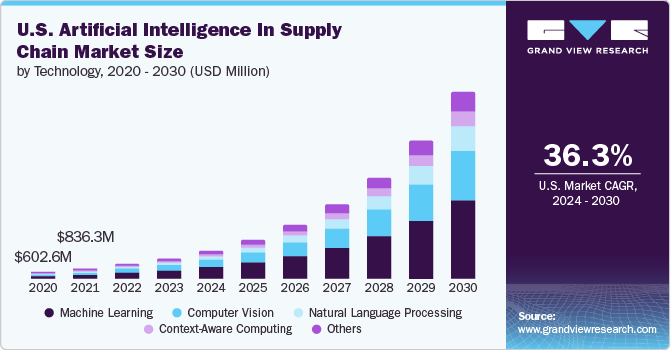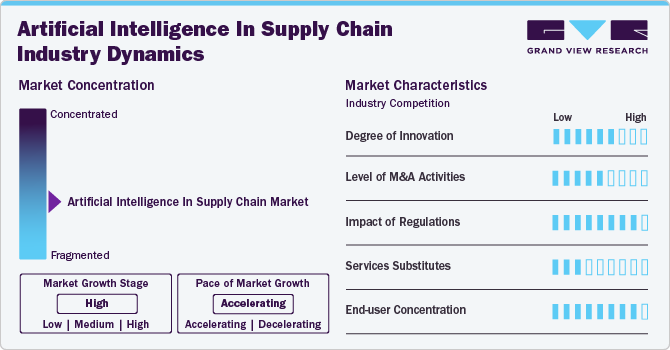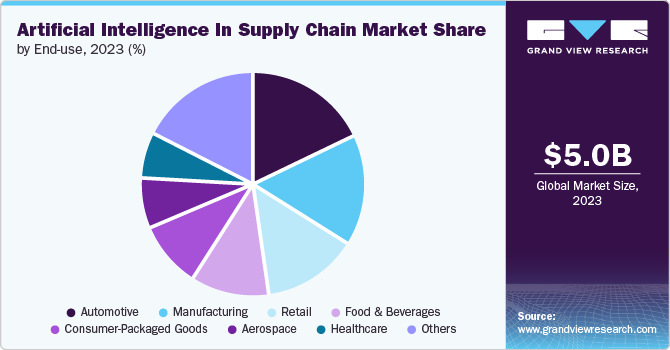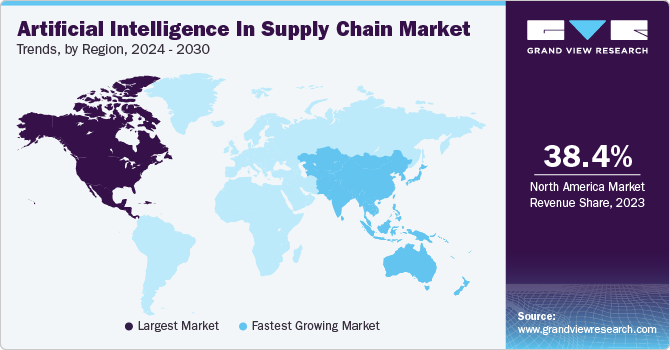
Artificial Intelligence in Supply Chain Market Size, Share & Trends Analysis Report By Offering (Hardware, Software, Services), By Technology, By Application, By End Use, By Region, And Segment Forecasts, 2024 - 2030
- Report ID: GVR-4-68040-329-4
- Number of Report Pages: 122
- Format: PDF
- Historical Range: 2017 - 2022
- Forecast Period: 2024 - 2030
- Industry: Technology
Market Size & Trends
The global artificial intelligence in supply chain market size was estimated at USD 5.05 billion in 2023 and is projected to grow at a CAGR of 38.9% from 2024 to 2030. Companies are increasingly seeking ways to optimize their supply chains, reduce costs, and gain greater visibility into operations. AI offers solutions for automating tasks, analyzing vast amounts of data, and generating actionable insights that improve efficiency and transparency.

The rise of e-commerce has amplified the demand for streamlined and efficient supply chains. Consumers expect fast and reliable delivery, which necessitates AI-powered solutions for demand forecasting, inventory management, and optimized logistics. Moreover, supply chains are vulnerable to disruptions caused by various factors. AI helps businesses anticipate and mitigate these disruptions by analyzing real-time data and suggesting proactive measures.
Technological advancements also help end use companies to implement market growth. The increasing volume of data generated within supply chains necessitates powerful tools for analysis. AI excels at handling big data, extracting valuable insights, and transforming them into actionable strategies. Furthermore, the integration of AI with Internet of Things (IoT) sensors and cloud computing platforms allows for real-time data collection, processing, and analysis. This enables AI to make more informed decisions and provide greater agility within the supply chain. Thus, driving the market growth.
The AI in supply chain helps in enhancing transportation planning and execution, optimizing store-level assortments, automating order settlement. Thus, companies are developing new solutions to help clients in various industries, such as retail and consumer packaged goods (CPG) Industries. For instance, in January 2024, International Business Machines Corporation, AI in supply chain solutions provider, collaborated with SAP SE, to develop business new AI solutions for the consumer goods and retail industries. Leveraging their combined expertise in technology, International Business Machines Corporation integrated its enterprise-ready AI and data platform, along with AI assistants, into SAP solutions. This collaboration between International Business Machines Corporation and SAP SE is paving the way for the development of both generative and traditional AI solutions, aimed at simplifying the complexities associated with the direct store delivery business process and product portfolio management. IBM Consulting and SAP SE are currently engaging with CPG clients globally to identify precise requirements for creating secure and scalable AI solutions. These solutions would seamlessly integrate with SAP's Direct Distribution solution. The aim of developing these new solutions is to aid CPG companies, wholesale distributors, and retailers in optimizing store-level assortments, enhancing product distribution, and boosting incremental revenue.
Market Concentration & Characteristics
The industry is characterized by a high degree of innovation by advancements in technologies such as IoT, cloud computing, and Big Data. The integration of Artificial Intelligence (AI) and the Internet of Things (IoT) is giving rise to predictive maintenance. Sensors embedded in machinery and equipment can collect real-time data, and AI can analyze it to predict potential failures. This allows for proactive maintenance, minimizing downtime and production disruptions.
The industry is characterized by a high level of merger and acquisition (M&A) activity by the leading players. Companies recognize the immense strategic value of AI-powered supply chain solutions. Acquiring an AI startup or a company with established AI capabilities allows them to gain a competitive edge through improved efficiency, cost reduction, and better risk management.

Supply chains often involve sensitive data about customers, suppliers, and logistics. Regulations focus on data privacy and security, ensuring companies have robust measures in place to protect this data throughout the AI lifecycle. The European Union's proposed AI Act is a prominent example for transparency, accountability, and risk management for certain high-risk AI applications.
There is no direct substitute for this industry. For intricate global operations, AI's ability to handle large datasets and complex relationships might be necessary. Simpler supply chains might be well-managed with traditional methods.These rely on pre-defined rules and logic to automate tasks and make decisions. While not as sophisticated as AI, they can be effective for well-defined, repetitive tasks. They are often simpler to implement and maintain compared to AI, making them suitable for companies with limited resources or technical expertise.
End-user concentration is a significant factor in global industry. Various industries such as retail, manufacturing, logistics and transportation are increasingly implementing AI in the supply chain solutions. Major corporations with complex global supply chains stand to benefit significantly from AI-powered optimization and automation. They have the resources to invest in sophisticated AI solutions and the data volume to train them effectively.
Offering Insights
Based on offering, the software segment led the market with the largest revenue share of 41.8% in 2023. AI software offers a wide range of functionalities within the supply chain, from demand forecasting and inventory optimization to predictive maintenance and automated decision-making. This versatility allows businesses to address various challenges and customize solutions to their specific needs. In addition, AI software can be easily scaled up or down depending on the size and complexity of the supply chain.
The services segment is anticipated to grow at a significant CAGR over the forecast period. AI supply chain solutions require ongoing maintenance and updates to function optimally. Service providers offer support packages that ensure the AI systems are running smoothly, addressing any technical issues that may arise. End users are increasingly seeking measurable benefits from their AI investments. Service providers can help businesses define key performance indicators (KPIs) and track the ROI of their AI implementations, demonstrating the value of AI within the supply chain.
Application Insights
Based on application, the supply chain planning segment led the market with the largest revenue share of 32.5% in 2023. AI algorithms analyze historical data, sales trends, and external factors to accurately forecast demand. This allows businesses to maintain optimal inventory levels, avoiding stockouts and overstocking, which can be both costly and inefficient. Moreover, AI considers factors such as, traffic patterns, fuel costs, and delivery deadlines to optimize transportation routes, reducing transportation costs and improving delivery times.
The warehouse management segment is expected to grow at a significant CAGR over the forecast period. AI systems can automate repetitive tasks like order picking, packing, and sorting. This eliminates human workers for more complex tasks and reduces the risk of errors associated with manual processes. Moreover, AI algorithms can optimize picking routes and packing configurations based on factors like item size, weight, and destination. This minimizes travel time within the warehouse and ensures efficient packing, leading to faster order fulfillment.
End Use Insights
Based on end use, the automotive segment led the market with the largest revenue share of 17.7% in 2023. The growing demand for Electric Vehicles (EVs) and Autonomous Vehicles (AVs) challenges the supply chain due to the complexity of these vehicles. Thus, AI in supply chain solutions can handle the intricate networks of suppliers involved in EV and AV production, ensuring timely delivery of specialized parts. Moreover, AI-powered quality control systems ensure these advanced vehicles meet stringent safety and performance standards.

The retail segment is anticipated to grow at a significant CAGR over the forecast period. AI analyzes historical sales data, customer trends, and external factors to predict demand with greater accuracy. This allows retailers to maintain optimal inventory levels, preventing stockouts that frustrate customers and overstocking that leads to wasted storage space and potential markdowns. Moreover, AI enables unified inventory management across online and physical stores, ensuring smooth order fulfillment regardless of the chosen channel. AI facilitates real-time tracking of goods throughout the supply chain, providing retailers with greater transparency and control over their operations.
Regional Insights
North America dominated with the artificial intelligence in supply chain market with a revenue share of 38.4% in 2023. North American companies face intense competition and pressure to reduce costs while maintaining high levels of customer service. AI supply chain solutions for automating tasks, analyzing vast amounts of data, and generating actionable insights that improve efficiency, transparency, and agility within the supply chain.

U.S. Artificial Intelligence in Supply Chain Market Trends
The artificial intelligence in supply chain market in the U.S. is expected to grow at the fastest CAGR from 2024 to 2030. The U.S. manufacturing and logistics sectors face labor shortages. AI can address this by eliminating human workforce to focus on higher-value activities that require skills and experience. Moreover, the U.S. is a prominent country in AI research and development. This fosters the creation of advanced AI solutions specifically designed for supply chain applications.
The Canada artificial intelligence in supply chain market held a significant share in the North America in 2023. Canadian companies grapple with managing complex supply chains that often stretch across vast geographical distances. AI optimizes delivery routes, considering factors such as weather and traffic patterns, to ensure efficient and cost-effective transportation of goods across Canada's large landmass.
Europe Artificial Intelligence in Supply Chain Market Trends
The artificial intelligence in supply chain market in the Europe is expected to witness at a significant CAGR over the forecast period. European supply chains are often intricate and involve multiple countries with varying regulations. AI offers solutions for visibility and traceability.Moreover, Europe faces an aging workforce and labor shortages in logistics and manufacturing. AI can address this by augmenting the workforce, and upskilling and reskilling initiatives.
The UK artificial intelligence in supply chain market held a significant share in the Europe in 2023. The UK has a thriving AI research community with universities and institutions at the forefront of AI development. This fosters innovation in AI solutions specifically designed for UK supply chain challenges. UK continues to collaborate with international partners in the AI and supply chain sectors. This collaboration fosters knowledge sharing and accelerates AI adoption within the UK supply chain landscape.
The artificial intelligence in supply chain market in Germany is expected to grow at the fastest CAGR from 2024 to 2030. Germany is a prominent country in adopting Industry 4.0, which emphasizes automation and data exchange across the manufacturing value chain. AI plays a crucial role in optimizing production processes, and predictive maintenance.
The France artificial intelligence in supply chain market is expected to grow at the fastest CAGR from 2024 to 2030. France, a major player in the European manufacturing and logistics sector, is experiencing significant growth in AI adoption for its supply chains.Sustainability is a growing concern for France businesses. AI can be used to optimize logistics routes, reduce emissions, and ensure responsible sourcing throughout the supply chain, aligning with France's commitment to environmental responsibility.
Asia Pacific Artificial Intelligence in Supply Chain Market Trends
The artificial intelligence in supply chain market in the Asia Pacific is anticipated to register at the fastest CAGR over the forecast period. The APAC region is experiencing a significant surge in AI adoption for supply chain management, fueled by a confluence of factors specific to the region's economic landscape and technological advancements. The APAC region boasts the fastest-growing e-commerce market globally. AI offers solutions for efficient order fulfillment and delivery, and personalized customer experiences.
The India artificial intelligence in supply chain marketheld a significant share in the Asia Pacific in 2023. India, with its rapidly growing economy and complex supply chains, presents a unique landscape for AI adoption in the logistics and manufacturing sectors. Indian supply chains are often plagued by inefficiencies, such as congestion, unpredictable demand, and poor logistics management. AI offers solutions for route optimization and traffic management, demand forecasting and inventory management.
The artificial intelligence in supply chain market in China held a significant share in the Asia Pacific in 2023. China's "Made in China 2025" initiative emphasizes automation and smart manufacturing. AI plays a crucial role in optimizing production processes. Moreover, China boasts the world's largest e-commerce market with a growing demand for fast and reliable delivery. AI offers solutions for Intelligent Warehousing and Order Fulfillment.
The Japan artificial intelligence in supply chain market held a significant share in the Asia Pacific in 2023. Japan, a prominent country in automation and robotics, is actively integrating AI into its supply chains to address unique challenges and maintain its competitive edge. Moreover, Japan faces a shrinking workforce due to its low birth rate and aging population. AI offers solutions for Just-in-Time (JIT) manufacturing and inventory management.
Middle East & Africa Artificial Intelligence in Supply Chain Market Trends
The artificial intelligence in supply chain market in Middle East & Africa is anticipated to grow at the fastest CAGR over the forecast period. MEA supply chains often face inefficiencies like inadequate infrastructure, limited visibility, and manual processes. AI offers solutions for demand forecasting and inventory management. Moreover, several MEA governments are actively promoting AI adoption through initiatives like funding research projects, offering tax breaks for AI implementation, and developing national AI strategies.
Key Artificial Intelligence In Supply Chain Company Insights
Key companies included in this market are Advanced Micro Devices, Inc., Alibaba.com, and Amazon.com, Inc. The active companies in the global market are focusing aggressively on expanding their customer base and gaining a competitive edge over their rivals. Hence, they pursue various strategic initiatives, including partnerships, mergers & acquisitions, collaborations, and new product/ technology development. For instance, in December 2023, Blue Yonder Group, Inc., a provider of supply chain platforms, introduced a new generative AI feature called Blue Yonder Orchestrator as part of its Luminate Cognitive Platform. The latest feature integrates large language models (LLMs), cloud data, and prompts engineering to suggest decisions for supply chain management. Businesses can leverage Blue Yonder Orchestrator as a reliable supply chain aide, enhancing intuition with data value to enable smarter and quicker decision-making.
Key Artificial Intelligence in Supply Chain Companies:
The following are the leading companies in the artificial intelligence in supply chain market. These companies collectively hold the largest market share and dictate industry trends.
- Advanced Micro Devices, Inc.
- Alibaba.com
- Amazon.com, Inc.
- Deutsche Post DHL Group
- FedEx
- International Business Machines Corporation
- Intel Corporation
- Microsoft Corporation
- NVIDIA Corporation
- Oracle Corporation
- Samsung
- SAP SE
Recent Developments
-
In April 2024, SAP SE introduced significant AI enhancements within its supply chain solutions, set to drive a revolutionary surge in productivity, efficiency, and accuracy within manufacturing sectors. Leveraging AI to analyze real-time data, these advancements would empower businesses to harness their data for improved decision-making throughout the supply chain, streamline product development processes, and enhance manufacturing efficiency
-
In April 2024, Vitesco Technologies GmbH, an automotive supplier, partnered with DHL Group to enhance the resilience and robustness of supply chains within the automotive sector. DHL Supply Chain acting as the principal logistics partner, consolidating cargo volumes from various major corporations to create synergies and unlock new optimization opportunities. The logistics specialists tap into the full spectrum of freight carriers and forwarding agents, ensuring the delivery of transport solutions are the most eco-friendly, and cost-efficient. This partnership would be beneficial for Vitesco Technologies’ customers, leading to supply chains that are durable
-
In January 2024, Lenovo, a provider of IT products, developed Supply Chain Intelligence (SCI), a solution powered by AI that constantly examines data from the supply chain to detect and address issues as they occur. This solution consolidates all the company's supply chain transactions and management systems into one unified platform, which is managed by smart tools
Artificial Intelligence In Supply Chain Market Report Scope
|
Report Attribute |
Details |
|
Market size value in 2024 |
USD 7.13 billion |
|
Revenue forecast in 2030 |
USD 51.12 billion |
|
Growth rate |
CAGR of 38.9% from 2024 to 2030 |
|
Base year for estimation |
2023 |
|
Historical data |
2017 - 2022 |
|
Forecast period |
2024 - 2030 |
|
Quantitative units |
Revenue in USD billion/million and CAGR from 2024 to 2030 |
|
Report coverage |
Revenue forecast, company ranking, competitive landscape, growth factors, and trends |
|
Segments covered |
Offering, technology, application, end use, region |
|
Regional scope |
North America; Europe; Asia Pacific; Latin America; Middle East & Africa |
|
Country scope |
U.S.; Canada; Mexico; Germany; UK; France; China; India; Japan; Australia; South Korea; Brazil; UAE; South Africa; KSA |
|
Key companies profiled |
Advanced Micro Devices, Inc.; Alibaba.com; Amazon.com, Inc.; Deutsche Post DHL Group; FedEx; International Business Machines Corporation; Intel Corporation; Microsoft Corporation; NVIDIA Corporation; Oracle Corporation; Samsung; SAP SE |
|
Customization scope |
Free report customization (equivalent up to 8 analyst’s working days) with purchase. Addition or alteration to country, regional & segment scope. |
|
Pricing and purchase options |
Avail customized purchase options to meet your exact research needs. Explore purchase options |
Global Artificial Intelligence In Supply Chain Market Report Segmentation
This report forecasts revenue growth at global, regional, and country levels and provides an analysis of the latest industry trends in each of the sub-segments from 2017 to 2030. For this study, Grand View Research has segmented the global artificial intelligence in supply chain market report based on offering, technology, application, end use, and region.
-
Offering Outlook (Revenue, USD Billion, 2017 - 2030)
-
Hardware
-
Software
-
Services
-
-
Technology Outlook (Revenue, USD Billion, 2017 - 2030)
-
Machine Learning
-
Computer Vision
-
Natural Language Processing
-
Context-Aware Computing
-
Others
-
-
Application Outlook (Revenue, USD Billion, 2017 - 2030)
-
Supply Chain Planning
-
Warehouse Management
-
Fleet Management
-
Virtual Assistant
-
Risk Management
-
Inventory Management
-
Planning & Logistics
-
-
End Use Outlook (Revenue, USD Billion, 2017 - 2030)
-
Manufacturing
-
Food and Beverages
-
Healthcare
-
Automotive
-
Aerospace
-
Retail
-
Consumer-Packaged Goods
-
Others
-
-
Regional Outlook (Revenue, USD Billion, 2017 - 2030)
-
North America
-
U.S.
-
Canada
-
Mexico
-
-
Europe
-
UK
-
Germany
-
France
-
-
Asia Pacific
-
China
-
India
-
Japan
-
Australia
-
South Korea
-
-
Latin America
-
Brazil
-
-
Middle East & Africa
-
UAE
-
South Africa
-
KSA
-
-
Frequently Asked Questions About This Report
b. The global artificial intelligence in supply chain market size was estimated at USD 5.05 billion in 2023 and is expected to reach USD 7.13 billion in 2024.
b. The global artificial intelligence in supply chain market is expected to grow at a compound annual growth rate of 38.9% from 2024 to 2030, reaching USD 51.12 billion by 2030.
b. North America dominated the AI in supply chain market with a share of 38.4% in 2023. North American companies face intense competition and pressure to reduce costs while maintaining high levels of customer service. AI supply chain solutions for automating tasks, analyzing vast amounts of data, and generating actionable insights that improve efficiency, transparency, and agility within the supply chain.
b. Some key players operating in the AI in supply chain market include Advanced Micro Devices, Inc.; Alibaba.com; Amazon.com, Inc.; Deutsche Post DHL Group; FedEx; International Business Machines Corporation; Intel Corporation; Microsoft Corporation; NVIDIA Corporation; Oracle Corporation; Samsung; and SAP SE.
b. Key factors that are driving artificial intelligence in supply chain market growth include the growing adoption of AI to enhance consumer services and satisfaction and the growing focus on improving organizational performance and operational efficiency.
We are committed towards customer satisfaction, and quality service.
"The quality of research they have done for us has been excellent."




